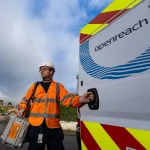Ofcom UK Probe Brsk Over Birmingham Deployment of Broadband Poles UPDATE

Network operator Brsk, which is in the process of being merged into Netomnia (here), are facing an investigation by Ofcom after the regulator suggested that the operator may have “failed to comply with its obligations” under Code Powers during the roll-out of new “telegraph poles” as part of their new full fibre (FTTP) broadband ISP network in Birmingham.
The operator, which has already reached 633,000 homes, is currently building out its new network across parts of West Yorkshire, Lancashire, Greater Manchester, Cheshire, and the West Midlands (Birmingham and The Black Country). Much of this work has involved the deployment of wood poles to run overhead fibre, which is a common practice, albeit one that has attracted a fair few complaints over the past few years (a lot of people find them ugly, particularly when deployed in areas that haven’t had them before).
Such poles are quick and cost-effective to build, can be deployed in areas where there may be no space or access agreement to safely put new underground cables, are less disruptive (avoiding the noise, access restrictions and damage to pavements of street works) and can be built under Permitted Development (PD) rights with only minimal prior notice. But it’s the last one in this list that seems to be causing problems for brsk today.
Advertisement
Ofcom states that, following a complaint, they have opened an investigation into “whether BRSK failed to comply with its obligations under the ECC Regulations to consult with, and provide 28 days’ written notice to, a local planning authority before installing telegraph poles in the Birmingham area.”
In May 2024, Ofcom received a complaint and supporting evidence which gave Ofcom reasonable grounds to suspect that BRSK may have breached Regulation 3(1)(b) and/or Regulation 5(1) of the Regulations when installing telecommunications poles to build its broadband network in the Birmingham City area.
Ofcom takes compliance with the Regulations very seriously. Meaningfully engaging with local planning authorities prior to installing network apparatus is an important element of the regulatory framework, not least because it enables the planning authority to bring relevant local considerations to the Code Operator’s attention and set appropriate conditions governing the installation of apparatus. Failure to follow the process set by the Regulations can therefore increase the risk of apparatus adversely impacting on the visual amenity of properties and posing hazards.
Ofcom’s investigation will examine whether there are reasonable grounds to believe that BRSK has failed to comply with Regulation 3(1)(b) and/or Regulation 5(1) of the Regulations when exercising its rights as a Code Operator under the Electronic Communications Code.
We will provide an update on this investigation in due course.
At present, we don’t have any details on the case itself beyond Ofcom’s vague overview, but we have asked Brsk to comment (they are working on that response now). The government has recently been signalling that they wanted to “end the deployment of unnecessary telegraph poles” (here), although Ofcom has warned that its powers are very limited in this area (here).
However, it would be very unusual for an operator not to notify a local planning authority about such deployments, and thus we don’t expect Ofcom’s probe to result in any major shifts for the wider industry. But we don’t yet have all of the key details or know the scale of this specific breach. Not to mention that this is the first such complaint we’ve seen, which means it still has the potential for setting a new precedent.
UPDATE 12:51pm
Advertisement
We’ve had a response from brsk.
Brsk Statement
Brsk Limited acknowledges and is fully supportive of the investigation launched today by Ofcom (Monday 30th September) into the potential breaches of the Electronic Communications Code 2003 in relation to poling work which was lodged by the Birmingham City Council local authority.
Brsk Limited has been engaging with Ofcom and Birmingham City Council for a number of months relating to this matter. We are committed to ensuring that we have an ongoing and proactive dialogue with Birmingham City Council and will continue to collaborate with them going forward. We are committed to full transparency and engagement remains a top priority for us as a business, especially in our engagements with local authorities wherever we deploy our network.
Stakeholder engagement is a top priority for brsk, and we are in ongoing discussions with the Department of Science, Industry and Technology on engagement processes and protocols to ensure that we continue to meet their expectations, and also those of local authorities and communities where we intend to upgrade and provide full fibre services to. Moreover, we are an active participant within the ISPA Poles Working Group, reviewing the Code of Practice for the Siting of Street Cabinets and Poles, with the aim of improving how the telecommunications industry can better engage and inform communities and local authorities about planned activities as we rollout full fibre across the UK.
Mark is a professional technology writer, IT consultant and computer engineer from Dorset (England), he also founded ISPreview in 1999 and enjoys analysing the latest telecoms and broadband developments. Find me on X (Twitter), Mastodon, Facebook, BlueSky, Threads.net and Linkedin.
« Virgin Media O2 UK Gift Free Access to Kids TV Channels in October 2024






















































Do the general public know that BT/openreach aren’t even allowed to use these poles being put up? OFCOM allow others to use these BT/openreach network but not vice versa. Hence why so many roadworks as the alters put these up and leave openreach no choice but to have to dig new underground track in to be able to provide their fibre network. So called chance for the underdogs and stop this monopoly. Not to mention how much local authorities make on permits etc to dig
Have they got nothing better to do, having bankrupted the city and turned it into a fly tipping dump.
An absolute eye sore thought these posts and cables were a thing of the past.
They are crossing over peoples properties without permission!
ACTION needs to be taken.
They are dangerous.